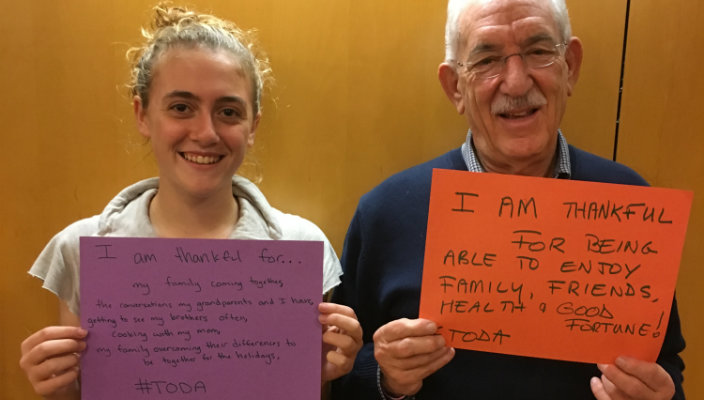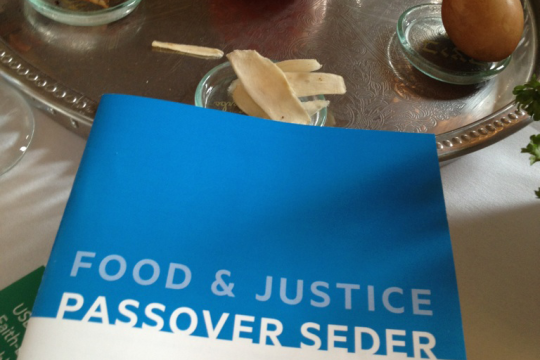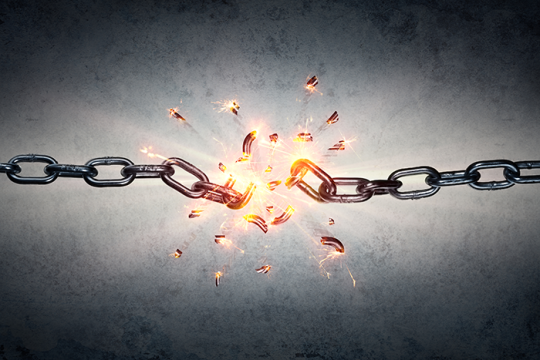
Last week’s Torah portion, Parashat Chukat, tells us how ,after 40 years of journeying through the desert, the people of Israel arrive in the wilderness of Zin. There, Miriam dies and gets buried. Her passing gives me a pause because I feel connected to her. Miriam’s death makes me consider the power of a namesake and the significance of lessons taught by the people who came before us. When I think of Miriam the prophetess, a true leader and mother of Israel, I am reminded of her resilience, the care she showed for her family, her contagious ability to find joy, and her boldness to speak up for things she felt were wrong. Just give me a tambourine, would ya?
According to the Midrash, a rolling rock called “Miriam’s Well” followed the Israelites through their wanderings in the desert, providing fresh water. The well dries up after Miriam’s passing, and the people call for her youngest brother, Moses, to relieve them from their thirst. In turn, Moses strikes the rock twice and the flow of water continues. Through loss, there is relief in continuity. This moment signifies a passing of the torch, a ratification, a gift and a transfer of knowledge that feels familiar in the relationships we create in many of our URJ youth programs.
Jocelyn McCauley, a high school student from one of our own Reform congregations, Temple Emanu-El of West Essex, N.J., is the winner of the Better Together program’s national essay writing contest this year. The program brings together teens and seniors for intergenerational learning, sharing and relationship building. While (at first reluctantly) attending her temple’s confirmation class, Jocelyn met with seniors at the congregation, like Tony, who shared with her how he became an outcast as a Jewish college student in London during the early 1940s. Jocelyn tells his story:
“Tony was constantly verbally attacked, and even subject to physical violence. While England was not under the control of the Nazis, there were high amounts of anti-Semitism present… [It] resulted from the belief that Jews were the reason for the bombings happening in the country and why family members and friends were being drafted into the military. Tony did not harbor any hatred towards those who hurt him, and instead allowed it to help grow his character. He told me the fundamentals of Judaism are what kept him going. For him, it was our sense of self-preservation, compassion, diligence, and empathy. To him, religion was like a moral compass.”
Storytelling is essential to our continuity as Jews. Intergenerational learning and giving are so much of what has kept our Judaism alive. Just as I am able to look to Miriam, the matriarch, for certain qualities, envisioning her leading the women of Israel with her tambourine ever so brightly, we have the opportunity to teach our youth so that they may have the faith and courage to nourish and continue our peoplehood. Jocelyn felt for a long time that religion was outdated and irrelevant to her, but her time with Tony taught her otherwise. She concludes her essay by stating:
“I will never be the ‘perfect’ Jew, but from now on, I will be a better Jew. I will fight for my beliefs and feel empathetic toward those in a different situation than myself. I will demonstrate that [Jews] are the kindest, yet strongest and most diligent people in our world.”
Through our programs, we have the ability, and even – responsibility – to teach compassion and understanding, qualities our world is thirsting for, perhaps more than ever before in the wake of recent tragic events in our country. It is our goal to show our teens how to listen, accept and learn from others who are different from them. Michelle Shapiro Abraham, director of program development for URJ Youth, shares:
“I had honestly never thought of doing programming with seniors and teens together beyond one-shot visits or story sharing. Watching these programs in action has been amazing, beautiful and touching. Not only are the teens bonding with one another, they are finding new mentors who can share their life experience and wisdom. This experience seems to amplify the impact on the teens, making their learning deeper and more meaningful.”
As a young woman, Jocelyn is able to take from what she heard a sense of purpose, the reasoning to become more kind and just, and lead on with those qualities. I ask: what tools will you give your youth to pass forward? What will you teach our young people that might urge them to pick up their spiritual tambourine?
Learn more about Better Together:
- Read the winning essay by Jocelyn McCauley
- Watch this remarkable video of the Adopt-A-Survivor program from Temple Sinai of Roslyn
- The power of intergenerational bonds by eJewishPhilanthropy
- Watch Elie Wiesel’s speech on hope, compassion, and the power of youth.
Have something to say about this post? Join the conversation in The Tent, the social network for congregational leaders of the Reform Movement. You can also tweet us or tell us how you feel on Facebook.
Related Posts

Passover 2024: The Three Central Messages of Pesach

Modern-Day Plagues of Injustice and Inequality
